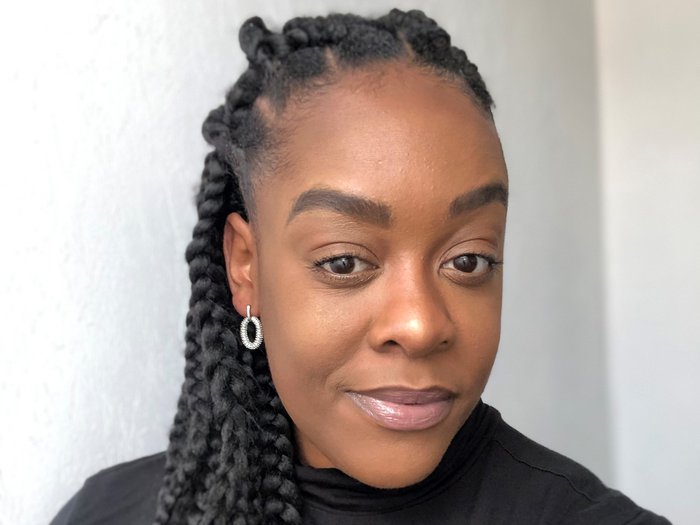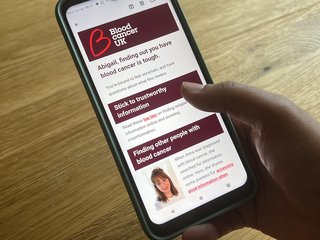Telling family and friends you have blood cancer
Simone was diagnosed with myeloma after a scan showed damage to her bones. She describes how different people reacted to the news, and gives her tips on telling other people.

Simone, diagnosed with myeloma
Simone and others worked with us to create a booklet of key information for anyone who's just been diagnosed with blood cancer, Your blood cancer diagnosis: What happens now? Order free copies for yourself, your family and friends.
I have a history of migraines and I’d had a particularly bad one that went on for ages. So my GP sent me for a brain scan. Four weeks later, I got an appointment letter inviting me to the oncology department. Well that made me panic because no one had said anything about cancer!
I was told there were lesions showing on the scan that may or may not be cancer, and a blood test showed that it was myeloma.
Being young and female, I was in a tiny minority. There wasn’t anyone who looked like me in the support groups!
I didn’t feel angry, but I did wonder, why me? Then, when it became clear I’d need treatment, I just felt like I wanted to get my life in order. So I organised the house in case people needed to come in to look after me. I bought some nice new cushion covers and some cute outfits for chemo day. It’s funny what helps you cope!
Telling my close family
When I was diagnosed, I hadn’t been with my partner that long. So the first thing I said was that he didn’t have to stick around and watch me deal with this cancer. He told me he wasn’t going anywhere. He’s been so strong for me. All through I’ve felt I have to be cheerful and smiley around other people. He’s the only person who knows when I’m not OK. It’s like having a safety valve – you might explode without someone who’s sees what’s really going on inside.
My mum was strong too, but she felt guilty. She thought the cancer was inherited and it was her fault, but I soon told her that wasn’t true. My dad came to all my appointments, and it was great to have someone there with me. It helped him too as he could hear what the doctors had to say and could be there for his baby girl as he calls me!
My daughter was 17 at the time. When I sat her down and told her about the myeloma she said, “OK, what does that mean?” I did tell her the statistics about life expectancy, but that that wasn’t going to be me. I aimed to be a miracle and supersede that. But as I’m her only parent, she was scared. She spent a lot of time at friends’ houses. That was upsetting as I’d have liked her to be there with me. But I realised it wasn’t just about me, and she was coping as best she could.
One really good thing was that before I started treatment, my mum, my dad and my daughter came with me to the pre-chemo meeting. It did help that we went together and asked our own questions, so we all knew what was coming.
Dealing with different reactions
You’ll find people react to your news in different ways. With some there are lots of tears. (Why are you crying? I’m not!) Some ask very direct questions like, are you going to die? (I don’t know! I don’t know about this disease!) Others go quiet because they just don’t know what to say. (Say something! Tell me a joke!) I find humour often helps in awkward situations!
You have to gauge each person – there’s no blanket way of dealing with everyone.
You might need different strategies for different people, and some people need to be told separately, especially if they’re hypersensitive. Tell people face to face if you can. Or send a message and follow up with a face-to-face conversation.
Overall, it really is best to be honest. It’s not productive to shy away from things, even with young children. I told my little nephew and my friend’s kids that aunty wasn’t very well and that my hair would fall out. When it did, I let them paint my head and try on my wigs, so it felt normal and not scary to them. I didn’t want it to be a taboo subject.
If your family finds it difficult to talk, have a family journal – a book where people can write questions and thoughts and you can respond. It’s always good to keep a journal anyway so you can look back and see how far you’ve come.
My final tip would be to set up a WhatsApp group or somewhere you can communicate with a bunch of people at the same time. I had one so I didn’t have a thousand phone calls after every chemo session. And if I didn’t feel like communicating, I got someone else to tell the group.
If you’re worried about telling someone you have blood cancer or aren’t sure how to approach the conversation, contact our Support Service. We can talk through how the conversation might go, and how you might respond to people’s reactions or questions. Call us free on 0808 2080 888 or [email protected].
Or go to our online community forum and ask other people with blood cancer for their advice.

Get a weekly support email from us
We'll send you clear and simple information, practical tips, and advice from other people with blood cancer, to help during the first few weeks and months after diagnosis.
